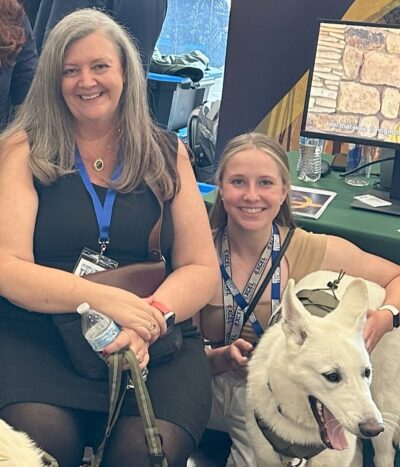Did You Ask?

Did You Ask?
by Deb Yamanaka
Generally, I enjoy being part of conversations with women about their experiences as leaders and future leaders. I’m always curious about the advice we give each other and the generational views and perspectives that are shared. So, at a recent conference I made my way down to a breakout session of about 300 women and was pleasantly surprised to find it wasn’t just a networking event.
My assistant and I found our table and tucked the dogs under the table. The women at the table ranged from their lower 20’s (my assistant) to their late 50’s/early 60’s. The table moderator introduced herself and her co-moderator.
I was looking forward to hearing more about my other tablemates, but we veered off introductions quickly and onto the topic of women competing against each other. Some chat about women being mean to each other in the workplace ensued and I just couldn’t relate.
So, when the moderator turned to me and asked if *I* compete against other women, I looked her straight in the eye and said, “Of course I do. The SAME way I compete against men.” As a business owner, my competitors are other businesses, regardless of the socio-economic status or other categorization of its leadership.
But I understand that among the woman-owned small business community, there is a sense that we should stick to the 5% of government contracting dollars designated for us. We don’t typically team with each other, and we shift uncomfortably – if not in all out disbelief – when a government official suggests that we band together as a single team to make procuring services easier for them.
But I also believe a rising tide lifts all boats. So, banding together – to me – looks like women working together to tackle the entire 50 percent of government contracting dollars that equal representation *actually* looks like to us.
As I listened to these women talk to each other about competition, it occurred to me that what frustrates them are the limits they feel being put on them to stay in their designated lanes.
Female representation in the workforce is gaining momentum but it is still taking a long time.
The moderator then expressed frustration at having been so far along in her career and how no one *told* her what she needed to do to break the Senior Executive Service barrier and get the appointment that looks like success for her.
I understand the privilege of the position I’m in. I understand the “rare air” as a woman leading a company such as Excel. I’m grateful for the system of people in my life who have been there along the way, encouraging me to step into this role. When I asked dozens of questions around if I should, and how I should, these people said heck yeah and then hopped onto the train with me.
But here I sat at a table with my new-to-the-professional-workforce assistant, wondering why we were still having this conversation – one I was drawn into when I was in my early career nearly 40 years ago.
But my mentors, back in the 80’s and for much of the first 25 years of my career, were mostly men. I wasn’t really competing with other women who were in roles above me. There just weren’t any. The other thing that occurred to me is that when I wanted something, I asked questions – all the questions – that would give me the answers that along the way have guided my steps. My greatest early career mentor, a man named Fred, called them our “solving the problems of the world” discussions and he is the primary reason I have the foundational career skills I have.
He was the first to teach me what leadership could look like.
I thought back to the people in my life who have asked me what they needed to do to get to the next step in their careers. How many times I’ve sat with them – often late into the evening in my office – and shared my own thoughts. I thought about the mentoring programs I’ve volunteered for over the years and the amazing men and women I’ve worked with and celebrated as they take the next big steps in their own careers. A number of genuine friendships have grown out of those relationships.
Because they asked.
Of course, we need to give a lot more direction when people are early in their career. But as people ascend in their responsibilities, the best performers are ultimately those who need less and less oversight as they figure out how to deliver not only what is needed but more. You know they are showing up for the work and delivering quality and mentoring others around them. They bring their talent and experience to bear, and they understand and work on functioning as a team. We see that and we reward that. It’s what differentiates them.
My job, as the CEO, is to point the team in the direction we are going and lead. My job, as the CEO, is to provide clarity about our why and how, create and reflect our culture, manage our financial resources, and make sure we have the right people on board with us to deliver our mission and grow in the process.
One of my favorite parts of my job is to respond to employees who have identified something they want to do or try, determine if it’s something we can help with, and then help them get there.
I try to do this as authentically as possible.
So, to hear this senior but not quite SES woman ask why she wasn’t told what she needed to do – apparently by other women on her leadership team – I wondered why she ascribed this to competing with other women.
My guess is that they weren’t.
My guess is that she just didn’t ask.
